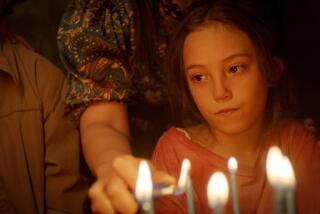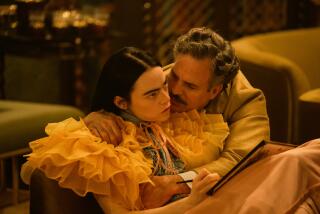STAGE REVIEW : ‘The Vortex’ Offers Coward at His Best--Seriously
The outbreak of war in the Persian Gulf Wednesday kept few people away from the final preview of “The Vortex” at the Doolittle Theatre in Hollywood. This early Noel Coward play about the decadence of the British leisure class in the 1920s might seem like a strange draw away from the real-life drama of bombs bursting over Baghdad. But the contrast itself may have been the thing that brought the people in--a kind of respite from CNN.
Anyone who expected something as giddy and frothy as “Blithe Spirit” or “Private Lives,” however, was in for a rude awakening. “The Vortex” has its dramaturgical roots in Ibsen, of all people. It was written in 1923 when the author was a lad of 24, and is one of Coward’s rare successful attempts at being serious.
When it opened in Hampstead with Coward in the pivotal role of Nicky Lancaster, he and the play became overnight sensations, both moving to London’s West End on the author’s 25th birthday.
That “The Vortex” retains much of its force 67 years later, even on a night when the casual brittleness of the overprivileged should pale in the face of human events, is a startling tribute to Coward who, for much of the rest of his life, tended to mistake melodrama for drama.
Not so with “The Vortex,” which clearly was written from a deeply personal wellspring. It remains skillful even when it comes perilously close to soap opera. And certainly this production, drawn from Philip Prowse’s 1989 staging of the play for Glasgow’s Citizens Theatre (which later also moved to London), deftly transcends the play’s riskier excesses.
In short, it keeps the potential melodrama within the domain of drama, thanks to some excellent performers and the restraint of director Robert Allan Ackerman.
The story focuses on the Lancaster household, one of those palatial upper-crusty mansions where a cocktail is a gin martini on a silver tray and where stunning-looking people drop in to pay court, outshining, outwitting and outmaneuvering one another.
Florence Lancaster (Stephanie Beacham) is the uncontested queen of this diaphanous realm, measuring her life not in coffee spoons but in young men she beds and leashes to her whims. The opening act introduces us to the “A” circle of friends: Sober-minded Helen (Suzanne Bertish), the only person with a clear view of things as they are; flighty Clara (Erica Rogers) who “eternally labors under the delusion that she really matters”; trivial Pawnie (Ian Abercrombie), whose own gayness is never acknowledged; and vapid Tom (Simon Templeman), Florence’s lover du jour .
Witticisms fly like malevolent sparks, supplanting substance until the arrival of Nicky (Rupert Everett), the prodigal son just back from Paris, who tells his mother he’s engaged. Florence, who hardly admits to a son that old, is shocked at first. But when his fiancee, the glacial Bunty Mainwaring (Molly Hagan), turns out to have had a previous fling with Tom, it’s all-out war.
Things do not end well, but we won’t ruin the journey with a detailed account. The ramifications of plot and emotion--from Nicky’s deep self-hatred to his father’s abject weakness in the face of Florence’s rampaging willfulness--is a darkening roller coaster that becomes increasingly suspenseful.
By Act III, we are witnessing the closet scene from “Hamlet,” with Florence a reluctant Gertrude and Nicky the doomed and driven prince. The blatant Ibsenism and Shakespearean parallels rather spoil things that Coward had managed splendidly on his own until then. The scene is just barely pulled from the fire by Everett’s and Beacham’s (and presumably director Ackerman’s) dedication to its kernel of truth.
Everett (who played the role in Glasgow and London) is an exposed nerve--very striking, very like the Danish Prince, but more fatally ruined and self-destructive. Beacham is all chiffon and steel until the final breakdown, while Bertish provides the only voice of reason. Hagan is a terrifying Bunty and George Innes remarkable in a pathetically self-effacing performance as Nicky’s hapless father. Everyone else is right in period--physically and psychologically.
Ambience, in fact, plays an intense role in this production. The elegant black, gray and white sets credited to Hugh Landwehr, and the effervescently stylish ‘20s costumes by Robert Wojewodski, are meticulous reproductions of the original Prowse designs. It is the confluence of such attentive detail in presentation and action that makes this revival a rare opportunity to experience Noel Coward at his most uncharacteristic best.
“The Vortex,” James A. Doolittle Theatre, 1615 N. Vine St., Hollywood. Tuesdays-Saturdays, 8 p.m.; Sundays, 7 p.m.; matinees Saturdays-Sundays, 2. Beginning Feb. 14, matinees Thursdays, 2. Ends March 31. $29-$40; (213) 410-1062, (714) 634-1300. Running time: 2 hours, 15 minutes.
More to Read
The biggest entertainment stories
Get our big stories about Hollywood, film, television, music, arts, culture and more right in your inbox as soon as they publish.
You may occasionally receive promotional content from the Los Angeles Times.










